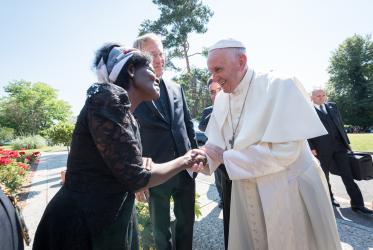In a lecture at the Institute for Ecumenical Studies at St Thomas Aquinas Pontifical University (Angelicum) on 13 December, World Council of Churches general secretary Rev. Dr Olav Fykse Tveit offered a lecture entitled "Ut Unum Sint: Between Winter and Spring, Reality and Prophecy, 1995 – 2020.”
In the morning, Tveit met with Cardinal Kurt Koch, president of the Pontifical Council for Promoting Christian Unity.
“In this academic year, you focus on the Papal Encyclical Ut unum sint,” noted Tveit. “In 1995, when Pope Johannes Paul II offered the encyclical first of all to the primates and bishops of the Roman Catholic Church, but also to the wider audience of all concerned about ecumenism, there was a broadly shared fear that the ecumenical movement was stagnating or even disintegrating.”
"Pope John Paul II opened the new season for ecumenism. He even opened for a discussion about the role of the Papacy and how to be serving the unity of all Christians."
Using the metaphors of ecumenical winter and spring, Tveit affirmed the vitality of the ecumenical movement and its relevance today.
“One of those who popularized the catchphrase of an ecumenical winter was indeed one of my predecessors as general secretary of the World Council of Churches, Emilio Castro,” said Tveit. “What you cannot hear so clearly: he put a question mark behind it.”
While at that time there were new ethical challenges that threatened to divide the churches, there was also growing cooperation between Christians from various traditions. "There was winter, but at the same time there was also summer,” said Tveit. “As a Norwegian, my experience was, of course, different from Emilio’s.”
Ecumenical spring
When Pope Francis was visiting Geneva on 21 June 2018, he spoke no more of winter, but said he looked forward to the flowering of a new ecumenical spring.
“There was a clear convergence and new shared initiatives that we could celebrate and encourage together," said Tveit. “So, there are new challenges, but there is also a clear commitment to moving forward together.”
We are no more thinking in a static way about the unity of the church, Tveit continued. “The unity we seek might even be the pilgrimage we are on together,” he said. “The cross opens our eyes to the sister and brother in need of solidarity.”
If we love one another, we strive to deepen our communion and make it real said Tveit. “Christ’s love will help us to move on to repent, reconcile, and grow in community,” he said. “There is an ecumenical spring, despite all difficulties.”








